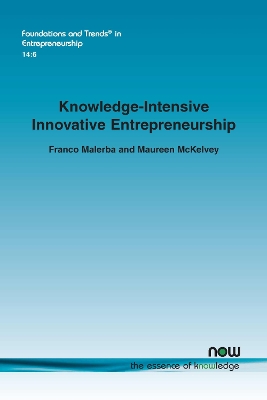Foundations and Trends (R) in Entrepreneurship
1 total work
Knowledge-Intensive Innovative Entrepreneurship
by Franco Malerba and Maureen McKelvey
Published 30 January 2019
This monograph examines knowledge-intensive innovative entrepreneurship (KIE). The emerging literature on KIE stresses the relevance of the knowledge-based economy, the central position of innovation in modern industries and services and the essential role of new firms in the economic growth of countries. Therefore, Knowledge-Intensive Innovative Entrepreneurship puts forward the argument that KIE enables a modern view of entrepreneurship that links the intense use of knowledge by new ventures with an intense innovative activity related to the economy and markets.
The positioning of the emerging literature on KIE has been done relative to three starting points. First, this monograph focuses primarily upon economic aspects of entrepreneurs and entrepreneurship; second, the emerging literature on KIE builds upon a Schumpeterian tradition of the importance of the entrepreneur and of innovations in the dynamics of the economy and the role of knowledge in entrepreneurship; and third this monograph focuses upon innovation systems related to innovation. Following the introduction, this monograph volume is divided into three parts as follows. Part II focuses upon issues related to KIE including theory, definitions, and measurements. Part III focuses upon understanding KIE and the evidence on KIE. Finally, Part IV focuses upon a process model and on future research directions.
The positioning of the emerging literature on KIE has been done relative to three starting points. First, this monograph focuses primarily upon economic aspects of entrepreneurs and entrepreneurship; second, the emerging literature on KIE builds upon a Schumpeterian tradition of the importance of the entrepreneur and of innovations in the dynamics of the economy and the role of knowledge in entrepreneurship; and third this monograph focuses upon innovation systems related to innovation. Following the introduction, this monograph volume is divided into three parts as follows. Part II focuses upon issues related to KIE including theory, definitions, and measurements. Part III focuses upon understanding KIE and the evidence on KIE. Finally, Part IV focuses upon a process model and on future research directions.
